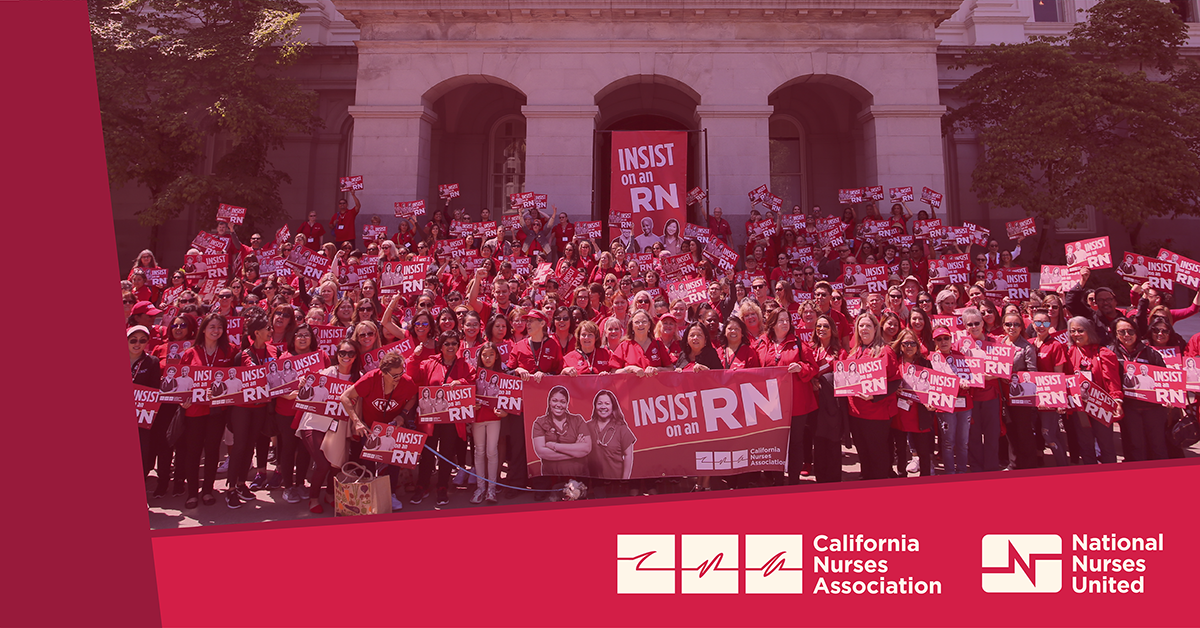CNA sponsors bills to report insurance denials and end exploitative worker contracts

By Michelle Morris and Chuleenan Svetvilas
National Nurse magazine - Jan | Feb | March 2025 Issue
In February, California State Assemblymember Liz Ortega of Hayward introduced A.B. 682, legislation authored by Ortega and sponsored by California Nurses Association (CNA). The new bill seeks to mandate collection and public reporting of health insurance claims denial information for each health plan regulated by the California Department of Managed Health Care and the California Department of Insurance. This is something nurses believe can expose the broken trust between insurers and patients at the root of our broken health care system.
“Insurance companies see our patients as numbers on a spreadsheet, but they’re real people to us as nurses at their bedsides,” said Michelle Gutierrez Vo, RN and president of CNA. “Having publicly available information on why insurers deny claims is a major move to expose how health care is systematically denied to our patients.”
“Millions of Californians are paying high monthly premiums for their health insurance ― only to find that when they get sick and need it, their claims are denied,” said Assemblymember Ortega. “Statistics on health insurance denials are not made public. But the numbers we have from Healthcare.gov paint an alarming picture: One in five claims are denied even if you remain in-network. If you’re forced to seek care out-of-network, you have nearly a 50/50 chance of having your claim denied.”
The information collected and reported would include the number of claims denied, the costs of denied claims, whether or not artificial intelligence was used in the decision, and — significantly — reasoning for denying claims, such as a lack of prior authorization or an out-of-network provider. This information will be especially relevant for denied claims for timely, lifesaving care.
Taken together, these measures will publicly document why insurance claims are denied, exposing the tactics insurance companies use to delay or deny coverage for patients.
While California prides itself on a low uninsured rate, CNA nurses support A.B. 682 to expose how health care plans are deliberately underinsuring customers, leaving nurses’ patients without essential health care and with no explanation why care has been denied.
In March, California State Assemblymember Ash Kalra introduced CNA-sponsored bill, A.B. 692, which would end exploitative “stay-or-pay” worker contracts that coerce workers to enter agreements requiring them to pay an alleged debt or other financial penalty to their employer if they leave their job before a certain time period.
One common type of stay-or-pay contract is one with “training repayment agreement provisions” (TRAPs), where a worker is forced to pay back a company for the costs of purported training if they leave their job before the end of the minimum work period. TRAPs are often targeted at newly licensed nurses who are first starting their careers as RNs, immigrant nurses, or at nurses in areas where one or a few health care corporations dominate the labor market.
“TRAPs and other stay-or-pay contracts exploit nurses at the beginning of their careers,” said Gutierrez Vo. “It is wrong to force new nurses to pay for orientation and basic on-the-job training, locking them into two- or three-year contracts that would force them to pay thousands of dollars if they leave before their term is up. A.B. 692 would stop employers from using debt to trap nurses and other workers in unsafe or exploitative working conditions.”
“Placing a de facto ‘exit fee’ on a worker who chooses to leave a job is deceitful and unethical,” said Assemblymember Kalra. “By ending these exploitative stay-or-pay contracts, A.B. 692 will empower workers to leave jobs where they may be facing poor working conditions, whether that means safety hazards, harassment, or otherwise toxic work environments.”
Hospital employers promote these employer-mandated debt contracts as enhanced education and training programs, new graduate contracts, or so-called “residency” programs for RNs. Through TRAPs, employers shift to workers the costs of basic on-the-job training or orientation necessary to perform their work duties.
A 2024 study found that about one in 12 workers in the United States are subject to a TRAP. Through TRAPs and other stay-or-pay contracts, employers can use the threat of debt collection to silence whistleblowers, bust union activity, and lock workers into substandard jobs.